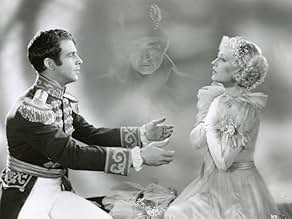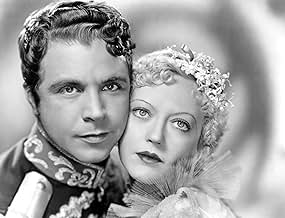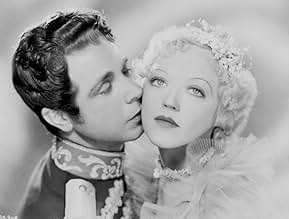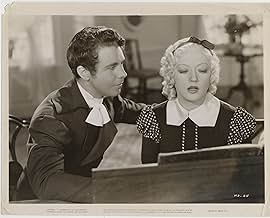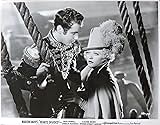Agrega una trama en tu idiomaNapoleon needs money to fight his wars in Europe so he wants 20 million dollars for the Louisiana Territory in the United States. To help the negotiations, he sends his brother, Jerome, to t... Leer todoNapoleon needs money to fight his wars in Europe so he wants 20 million dollars for the Louisiana Territory in the United States. To help the negotiations, he sends his brother, Jerome, to the U.S. on a goodwill tour. At a Maryland Horse Track, Jerome shows up without notice and ... Leer todoNapoleon needs money to fight his wars in Europe so he wants 20 million dollars for the Louisiana Territory in the United States. To help the negotiations, he sends his brother, Jerome, to the U.S. on a goodwill tour. At a Maryland Horse Track, Jerome shows up without notice and soon wins an afternoon tour with Betsy. He falls for her, but she will have little to do w... Leer todo
- Dirección
- Guionistas
- Elenco
- Henry
- (as Charlie Ruggles)
- Pippin
- (as Phillip Hurlic)
- Gabriel
- (sin créditos)
- Robert Livingston
- (sin créditos)
- Dirección
- Guionistas
- Todo el elenco y el equipo
- Producción, taquilla y más en IMDbPro
Opiniones destacadas
From the start, I must admit that for me, at least, the film has a major strike against it. The likable Dick Powell co-stars in the film, however, since it was made during his "singing star" period, he spends lots and lots of time singing...and I don't particularly like it in the film. In fact, Powell himself hated all the singing roles he had through the 1930s and loved when they gave him films where he could concentrate on his acting--which was usually very nice. Why they would have Davies starring opposite a singer like Powell is beyond me--it does not play to her strengths--she was certainly NOT a singer but was more adept at light comedy. Now had the female lead been Jeanette MacDonald, this might have worked better! As for the rest of the cast, Davies got some nice support. Likable and very capable supporting actors like Henry Stephenson, Arthur Treacher (oddly, he's NOT starring as a butler here), Claude Rains, Charlie Ruggles and Edward Everett Horton are on hand--adding a lot of nice color to the film.
Oh, and speaking of color, some might feel rightly put off by the slaves in the film. They are pretty happy folks and the white masters are pretty good to them (especially the sweet Davies) and this is pretty tacky. This "happy slave" stereotype is perhaps worse than just ignoring the plight of blacks during the era in which the film was set.
The setting for the film, incidentally, is both in France and the US during the early years at the beginning of the 19th century. Napoleon (Rains) need funds for his many wars and is trying to sell the Louisiana Territory to the Americans. During these negotiations, a French agent and brother to Napoleon (Powell) is in the States--though you really aren't sure why. In his capacity as an agent, he wants to remain incognito, so he poses as a French language teacher and is engaged by Davies' family to tutor her. Her family is quite wealthy--and happen to hate Napoleon.
Naturally, like romances of the day, you know that eventually the two will be in love. However, where it went from there was hard to predict because, amazingly, this weird and seemingly silly plot is actually based on the real life romance between Elizabeth Patterson and Jerome Bonaparte! And, oddly for a romance of the 1930s, it ends most tragically--not sweetly like the audience probably hoped.
So how true is this film? Well, in many ways it's surprisingly close--at least in the first 2/3 of the film. However, the scene with Napoleon convincing Elizabeth to give him up never occurred--as in real life, she tried and tried in vain to keep her Jerome--even though history shows us that he wasn't worth this loyalty (he was a real chuckle-head). I also cringed a bit with the scene between Napoleon and his mommy--it just came off as false and a bit silly. But worst of all was the tacked on happy ending--that never happened in real life!! In reality, Jerome left his pregnant wife and married a German princess!! Oops! This bit of historical liberty is simply unforgivable. How so many people could give this amiable but patently false film a 10 is beyond me.
But it does not matter when you deal with Frank Borzage,my favorite American director of the twenties/thirties.To say he gave it his all is diminish this director ,because there was always more to give,another passion to plumb,another open wound that demanded he raises his voice ;no one depicted love (against the whole world) as he did.In consequence ,the best scenes are to be found in the second part of the film:Marion Davis ,"translating" the letter into English in a voice chocked with emotion;the scene on the ship where the unfortunate lovers raises their glasses before the bell ring -this scene is similar to the ones we find in "Humoresque" before the hero goes to war ,and in "Street angel" when Janet Gaynor says goodbye to his love (who does not know it's a farewell celebration).In "Hearts divided" the sequence is too short ,and somewhat ruined by the final scenes although the song and the wall are romantic stuff.
As everything Borzage did ,"Hearts Divided" is a movie which deserves to be watched.I will not rate it as highly as Borzage's true masterpieces ("Seventh Heaven" "Street Angel" "Little man what now?" "A farewell to the arms" "Strange Cargo" or the immortal "Mortal storm") though.
** (out of 4)
Claude Rains masterful performance as Napoleon is wasted in this rather bland mess that was clearly meant to be a showcase for star Marion Davies. In the film, Napoleon sends his brother Bonaparte (Dick Powell) to America where he is to negotiate $20 million for the Louisiana Territory. Once there, he ends up teaching French to the beautiful Elizabeth Patterson (Davies) and eventually falls in love with her, which doesn't sit too well with his brother. It's well known that Davies felt at ease with a good comedy but the costume dramas made her nervous and that's obvious here in this film, which besides a few good things turns out to be a complete mess. Based on true events, the movie changes history around to fit the story so those looking for the truth might want to settle with a book on the subject. Hearst obviously thought Davies could handle the material but she can't and sadly she comes off looking pretty weak her. There wasn't a single scene where I believed her as this character as she didn't look the part nor was she able to act it. Powell, selected by Davies, isn't any better and often just appears to be modeling for the camera. The two of them have absolutely no chemistry together and this really kills the love story trying to be pushed here. The main reason to watch this film is for Rains performance, which is another great one by the character actor. He does a great job at filling the part of Napoleon and one can't help but wish the entire movie be built around him. Rains plays the character quite low but that power (or evilness) is easily viewable just by looking at his eyes. The film isn't helped any by some really silly dialogue or rather lampoonish scenes including one where a group of men follow Davies character up a tree. In the end, there might have been a good story somewhere here but one can't help that the producers didn't find it.
¿Sabías que…?
- TriviaThere is an outtake of actor Claude Rains, dressed as Napoleon, crying out, "God damn!" taken from this film.
- Citas
Napoleon Bonaparte: Every time you open your mouth the British Navy comes sailing out.
- ConexionesReferenced in Svengoolie: The Invisible Man (2008)
- Bandas sonorasLa Marseillaise
(1792) (uncredited)
Written by Claude Joseph Rouget de Lisle
Played and sung early in the picture
Selecciones populares
Detalles
- Tiempo de ejecución1 hora 27 minutos
- Color
- Mezcla de sonido
- Relación de aspecto
- 1.37 : 1
Contribuir a esta página


